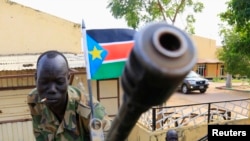Ugandan President Yoweri Museveni says East African nations have warned South Sudan’s former vice president Riek Machar to comply with a ceasefire or face action by regional nations.
But, Rebecca Nyandeng, an ally of Mr. Machar and widow of John Garang, the founder of South Sudan’s ruling Sudan People’s Liberation Movement (SPLM) party, says threats from regional leaders are unlikely to help resolve the country’s security situation.
“I don’t see it as a good way to resolve the problem in South Sudan because it will be like the region is going to South Sudan and fight with only one ethnic group or tribe in South Sudan,” said Nyandeng. “Negotiation is a better settlement and then the release of those [people] that the president has promised to release them, is the best way
Ms. Nyandeng, who is currently receiving medical treatment in Kenya following a brief period of house arrest, says it is important for people to acquaint themselves with the complexities of South Sudan’s society to be better equipped to help resolve the country’s challenges.
“This problem in South Sudan is a complex situation and needs to be tackled with a lot of care and a lot of education. People need to be educated about the situation in South Sudan,” said Nyandeng.
Regional leaders are pressing for face-to-face talks between President Salva Kiir and Machar by December 31.
Kiir announced he is willing to hold negotiations with Machar without preconditions. But, Machar insists he will only engage in talks if all the arrested members of the party are released.
The government proposed a ceasefire Friday, saying it would release eight of 11 senior politicians arrested over an alleged coup plot against President Kiir.
South Sudan Information Minister Michael Makuei told Reuters two of the imprisoned politicians were released but Machar “has not done anything.”
Some observers say Machar’s conditional demand could undermine efforts to help resolve the crisis through dialogue. Nyandeng disagreed.
“I see that it is one of the solutions [because] if this group is released then they would be able to help. Because those [people] were reformists they wanted to reform the party. The president has accepted to release them, and if he releases them they would be part of the solution to the problem,” said Nyandeng. “So, I don’t see it as a condition, but a reality, which will help the process of dialogue.”
United Nations Secretary General Ban Ki-Moon has called for the prosecution of perpetrators of human rights violations in south Sudan.
Nyandeng says she backs the prosecution call after the resolution of the crisis.
“I will agree with that because we want a free South Sudan where people are free mentally, free socially, and also free politically,” said Nyandeng.
“I will not accept any leader who will come to South Sudan and oppress [the people]… we will not accept that. So, let the law take its cause after the bloodshed is stopped and our people are secure then the investigation of human rights [violations] will come in so anybody can face the law.”
But, Rebecca Nyandeng, an ally of Mr. Machar and widow of John Garang, the founder of South Sudan’s ruling Sudan People’s Liberation Movement (SPLM) party, says threats from regional leaders are unlikely to help resolve the country’s security situation.
“I don’t see it as a good way to resolve the problem in South Sudan because it will be like the region is going to South Sudan and fight with only one ethnic group or tribe in South Sudan,” said Nyandeng. “Negotiation is a better settlement and then the release of those [people] that the president has promised to release them, is the best way
Ms. Nyandeng, who is currently receiving medical treatment in Kenya following a brief period of house arrest, says it is important for people to acquaint themselves with the complexities of South Sudan’s society to be better equipped to help resolve the country’s challenges.
“This problem in South Sudan is a complex situation and needs to be tackled with a lot of care and a lot of education. People need to be educated about the situation in South Sudan,” said Nyandeng.
Regional leaders are pressing for face-to-face talks between President Salva Kiir and Machar by December 31.
Kiir announced he is willing to hold negotiations with Machar without preconditions. But, Machar insists he will only engage in talks if all the arrested members of the party are released.
The government proposed a ceasefire Friday, saying it would release eight of 11 senior politicians arrested over an alleged coup plot against President Kiir.
South Sudan Information Minister Michael Makuei told Reuters two of the imprisoned politicians were released but Machar “has not done anything.”
Some observers say Machar’s conditional demand could undermine efforts to help resolve the crisis through dialogue. Nyandeng disagreed.
“I see that it is one of the solutions [because] if this group is released then they would be able to help. Because those [people] were reformists they wanted to reform the party. The president has accepted to release them, and if he releases them they would be part of the solution to the problem,” said Nyandeng. “So, I don’t see it as a condition, but a reality, which will help the process of dialogue.”
United Nations Secretary General Ban Ki-Moon has called for the prosecution of perpetrators of human rights violations in south Sudan.
Nyandeng says she backs the prosecution call after the resolution of the crisis.
“I will agree with that because we want a free South Sudan where people are free mentally, free socially, and also free politically,” said Nyandeng.
“I will not accept any leader who will come to South Sudan and oppress [the people]… we will not accept that. So, let the law take its cause after the bloodshed is stopped and our people are secure then the investigation of human rights [violations] will come in so anybody can face the law.”





